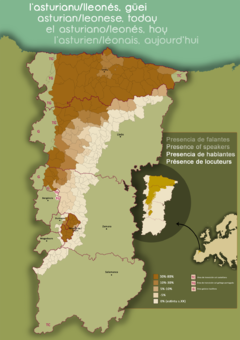Asturian Language
| Asturian | |
|---|---|
| asturianu | |
| Native to | Spain |
| Region | Autonomous Community of Asturias |
|
Native speakers
|
110,000 (2007)
|
| Latin | |
| Official status | |
|
Recognised minority
language in |
|
| Regulated by | Academia de la Llingua Asturiana |
| Language codes | |
| ISO 639-2 | |
| ISO 639-3 | |
| Glottolog | astu1245 |
| Linguasphere | 51-AAA-ca |

Linguistic area of Astur-Leonese, including Asturian
|
|
110,000 (2007)
Spoken by:
Asturian (/æsˈtʊəriən/;autonym: asturianu [astuˈɾjanu], formerly also known as bable [ˈbaβle]) is a West Iberian Romance language spoken in Asturias, Spain. Asturian is part of a wider linguistic group, the Astur-Leonese languages. The number of speakers is estimated at 100,000 (native) and 450,000 (second language). There are three main variants in the Astur-Leonese language family: Western, Central, and Eastern. For historical and demographic reasons, the standard is based on Central Asturian. Asturian has a distinct grammar, dictionary, and orthography. Regulated by the Academy of the Asturian Language, although it is not an official language of Spain it is protected under the Statute of Autonomy and is an elective language in schools.
Astur-Leonese is the historical language of Asturias, portions of the Spanish provinces of León and Zamora and the area surrounding Miranda do Douro in northeastern Portugal. Like the other Romance languages of the Iberian peninsula, it evolved from Vulgar Latin during the early Middle Ages. Asturian was closely linked with the Kingdom of Asturias (718–910) and the ensuing Leonese kingdom. The language had contributions from pre-Roman languages spoken by the Astures, an Iberian Hispano-Celtic tribe, and the post-Roman Germanic languages of the Visigoths and Suevi.
...
Wikipedia
